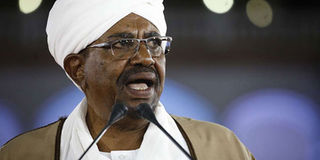Bashir names new PM as protest leaders dismiss emergency

Sudanese President Omar al-Bashir delivers a speech to the nation on February 22, 2019, at the presidential palace in the capital Khartoum. PHOTO | ASHRAF SHAZLY | AFP
What you need to know:
- On Friday, he imposed a nationwide state of emergency and dissolved the federal and provincial governments.
- The veteran leader pledged to form a government of technocrats to address Sudan's chronic economic woes.
President Omar al-Bashir named a new prime minister Saturday as he pressed on with a shake-up at the top, even as protest leaders dismissed his move to impose a state of emergency across Sudan to quell nationwide demonstrations.
Bashir's three-decade rule has been rocked by two months of protests that a deadly crackdown has failed to suppress.
On Friday, he imposed a nationwide state of emergency and dissolved the federal and provincial governments.
In a televised speech to the nation, the veteran leader pledged to form a government of technocrats to address Sudan's chronic economic woes, which have been the driving force behind the protests.
RESHUFFLES
On Saturday, Bashir sacked his vice president and long-time ally Bakri Hassan Saleh, replacing him with Defence Minister General Awad Ibnouf.
In a separate decree, he appointed Mohamed Tahir Ela, former governor of the agricultural state of Jazeera, as prime minister.
But protest organisers and their supporters in the political opposition dismissed the reshuffles.
They said the state of emergency showed that Bashir's rule was weakened and only its overthrow would now satisfy the protesters.
"Imposing a state of emergency shows the fear within the regime," the Alliance for Freedom and Change said.
"We will continue with our people to take to the streets across all towns and villages until our demand has been achieved."
RESIGN
The National Umma Party, whose leader Sadiq al-Mahdi was Sudan's elected prime minister when Bashir seized power in an Islamist-backed coup in 1989, said the protests against his successor's iron-fisted rule would carry on until he quits.
"Dissolving the government and imposing a state of emergency is nothing but a repetition of this regime's failures," it said.
"Nothing will satisfy the people who are taking to the streets except the overthrow of this regime."
Late on Saturday, crowds of protesters took to the streets in Omdurman, the capital's twin city, and in a district of Khartoum, witnesses said.
Demonstrators chanted their rallying cry of "freedom, peace, justice", but were quickly confronted by riot police who fired tear gas to disperse them, witnesses said.
ECONOMY
Analysts said the state of emergency was an act of desperation in the face of public anger.
"The declaration of emergency powers only makes it less likely that the economy can be revived," said Eric Reeves, a senior fellow at Harvard University, who has tracked Sudan's politics and economy for two decades.
"The regime has never understood economics... that's why they are in the mess they are."





